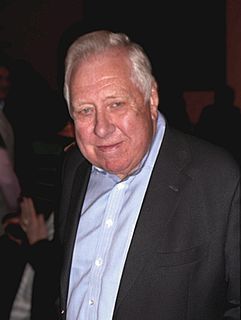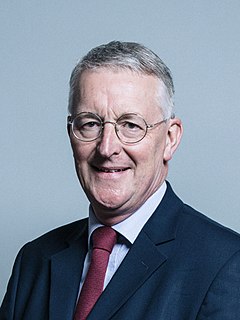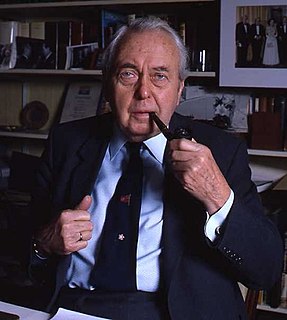
Roy Sydney George Hattersley, Baron Hattersley, PC, FRSL, is a British Labour politician, author and journalist from Sheffield. He was MP for Birmingham Sparkbrook for 33 years from 1964 to 1997. He served as Deputy Leader of the Labour Party from 1983 to 1992.

Denis Winston Healey, Baron Healey,, was a British Labour Party politician who served as Secretary of State for Defence from 1964 to 1970, Chancellor of the Exchequer from 1974 to 1979 and Deputy Leader of the Labour Party from 1980 to 1983.

Hilary James Wedgwood Benn is a British Labour Party politician who has been the Member of Parliament (MP) for Leeds Central since the by-election in 1999. He served in the cabinet from 2003 to 2010, under the premierships of both Tony Blair and Gordon Brown. From 2010 to 2016, he served in various Labour Party shadow cabinets, most recently as Shadow Foreign Secretary from May 2015 until June 2016, when he was dismissed by Labour leader Jeremy Corbyn. In October 2016, he was elected as the Chairman of the new Exiting the European Union Select Committee.
The Socialist Campaign Group of Labour MPs, often known as the Campaign Group, is a left-wing, democratic socialist grouping of Labour Party Members of Parliament in the House of Commons of the United Kingdom. It was formed in December 1982 as an alternative Parliamentary left-wing group to the Tribune Group. The Campaign Group, as it is commonly known, is often considered on the hard left of the Labour Party and has been highly critical of New Labour.
Eric Graham Varley, Baron Varley, PC was an English politician and former Cabinet Minister on the right wing of the Labour Party.
Eric Samuel Heffer was a British socialist politician. He was Labour Member of Parliament for Liverpool Walton from 1964 until his death. His working-class background and consciousness fostered his left-wing politics. With 12,000 books in his home, he also admitted to being a bibliophile. Due to his experience as a professional joiner, he made a speciality of the construction industry and its employment practices, but was also concerned with trade union issues in general. He changed his view on the European Common Market from being an outspoken supporter to an outspoken opponent, and served a brief period in government in the mid-1970s. His later career was dominated by his contribution to debates within the Labour Party and he defended the Liverpool City Council.

The 1980 Labour Party leadership election was held following the resignation of James Callaghan. Callaghan had been Prime Minister from 1976 to 1979 and had stayed on as leader of the Labour Party for eighteen months in order to oversee an orderly transition to his favoured successor, Denis Healey over his own deputy Michael Foot. However, during this period the party had become bogged down in internal arguments about its procedures and future direction.

The 1988 Labour Party leadership election saw Tony Benn, identified with the left wing of the British Labour Party, challenge the incumbent leader Neil Kinnock identified with the more moderate social democratic wing.

The 1981 Labour Party deputy leadership election took place on 27 September 1981 when Tony Benn unsuccessfully challenged the incumbent deputy leader Denis Healey at the party conference. Healey had been elected unopposed as deputy leader in the previous year.

Ed Miliband became Leader of the Labour Party and Leader of the Opposition upon being elected to the former post on 25 September 2010. The election was triggered by Gordon Brown's resignation following the party's fall from power at the 2010 general election, which yielded a Conservative – Liberal Democrat Coalition. Miliband appointed his first Shadow Cabinet in October 2010, following the Labour Party's Shadow Cabinet elections. These elections were the last such elections before they were abolished in 2011.

Michael Foot was Leader of the Opposition from 4 November 1980, following his victory in the 1980 leadership election, to 2 October 1983, when he was replaced by Neil Kinnock at the 1983 leadership election. The 1980 election was triggered by James Callaghan's loss at the 1979 general election, and Foot's own disastrous defeat in the 1983 general election.

James Callaghan became Leader of the Opposition on 4 May 1979 after losing the 1979 election and remained in that office until Michael Foot was elected Leader of the Labour Party on 2 October 1980. Callaghan named his Shadow Cabinet in June 1979, with Foot and the 12 elected members of the Shadow Cabinet assigned portfolios on 14 June and further appointments made on 18 June. From the opening of Parliament until that date, Callaghan's Cabinet, with a few exceptions, stayed on to shadow their former positions.
Elections to the Labour Party's Shadow Cabinet took place on 19 November 1981. There were 15 posts, rather than 12 as in previous years. In addition to the 15 members elected, the Leader, Deputy Leader, Labour Chief Whip, Labour Leader in the House of Lords, and Chairman of the Parliamentary Labour Party were automatically members.
Elections to the Labour Party's Shadow Cabinet took place on 18 November 1982. In addition to the 15 members elected, the Leader, Deputy Leader, Labour Chief Whip, Labour Leader in the House of Lords, and Chairman of the Parliamentary Labour Party were automatically members.

Harold Wilson of the Labour Party would form his Second Shadow Cabinet, as Leader of Her Majesty’s Most Loyal Opposition, after losing the 1970 general election to Conservative Edward Heath. He would retain leadership of the Opposition for the length of the Heath Ministry, from 1970 − 1974. In February 1974, his party would narrowly win an election. Wilson was then forced to form a minority government, which would only last until another election in October of that year. After that election, Wilson would form a majority government, known as the Second Wilson Ministry.

A deputy leadership election for the Labour Party in the United Kingdom took place on 2 October 1983 to replace incumbent Deputy Leader Denis Healey. Healey had served in the position since 1980, becoming deputy leader at the same time that Michael Foot became party leader. Foot and Healey had both announced their resignations after the general election on 9 June 1983, in which a disastrous performance left the Labour Party with just 209 seats in parliament.
The annual election to the Labour Party's Shadow Cabinet was conducted in 1987. In addition to the 16 members elected, the Leader, Deputy Leader, Labour Chief Whip, Labour Leader in the House of Lords, and Chairman of the Parliamentary Labour Party were automatically members.
Elections to the Labour Party's Shadow Cabinet were announced on 28 October 1983. In addition to the 15 members elected, the Leader, Deputy Leader, Labour Chief Whip, Labour Leader in the House of Lords, and Chairman of the Parliamentary Labour Party were automatically members.
Jeremy Corbyn assumed the position of Leader of the Opposition after being elected as Leader of the Labour Party on 12 September 2015; the election was triggered by Ed Miliband's resignation following the Labour Party's electoral defeat at the 2015 general election when David Cameron formed a majority Conservative government.
Elections to the Labour Party's Shadow Cabinet occurred in December 1971. In addition to the 12 members elected, the Leader, Deputy Leader, Labour Chief Whip, Chairman of the Parliamentary Labour Party, Labour Leader in the House of Lords, and Labour Chief Whip in the Lords were automatically members. The Labour Lords elected one further member, Baron Champion.










